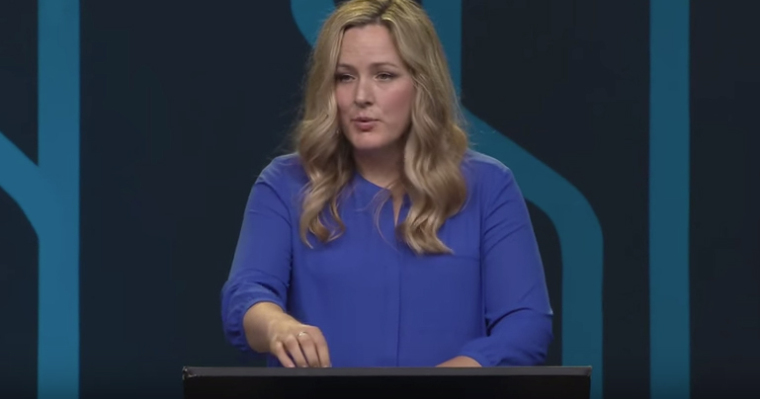God is using family's pain for good, Rick Warren's daughter says

LAKE FOREST, Calif. (CHRISTIAN EXAMINER)—Rick and Kay Warren's daughter, Amy Hilliker, told those at Saddleback's second Gathering on Mental Health and the Church her brother's mental illness and her own battles with anxiety and panic attacks have shaped her life. Hilliker opened up about her own story during the third plenary session of the conference on Thursday afternoon.
We have had to learn to accept each other's different levels of tolerance, of proximity to the struggle, differing ways of engaging Matthew. It divided us many times. But we were determined to keep pursuing love and connection with Matthew despite this tension.
Matthew Warren, the youngest child of the Warrens, committed suicide in 2013 after years of struggling with mental illness. The Warrens launched the first mental health conference at Saddleback the following year in an effort to mobilize the Christian community to minister to the needs of the mentally ill and to end the stigma often associated with such illnesses.
This year's conference took place Oct. 8 - 9 at Saddleback's Lake Forest, Calif., campus.
"Early on I had an idea that Matthew was different in some vulnerable way," Hilliker said. "My protective nature kicked in early and, in my own way, I joined my parents in rallying around our weakest link."
Hilliker is the oldest of the three Warren children and the only one born prior to the family's move to Orange County, Calif., in December of 1979 to start Saddleback Church. She not only told about her journey with Matthew, but she shared about her own experience with getting Lyme Disease at age 15 and the undiagnosed beginnings of her battle with anxiety, panic attacks and depersonalization.
"In my twenties, Matthew's illness ramped significantly at the same time my body began to crash from the undiagnosed chronic Lyme [Disease]," Hilliker said. "Between my illness, Matthew's illness and some other traumatic family circumstances, it often felt like we were living in this underground bunker. We were here existing on planet Earth but not really engaging with the real world or real people. We would occasionally lift that hatch and look out long enough and survey the land. Then the next wave of chaos would hit and we'd have to hunker down and hold onto each other and pray to make it through."
Hilliker notes her family's story wasn't unique. Many other families dealing with mental illness feel as if they're living in a bunker mentality. Yet, she adds, the family continued to try to engage Matthew—even though they often didn't know how. Because of the difficulty of knowing how to engage, she says, they hurt Matthew and one another greatly.
"We have had to learn to accept each other's different levels of tolerance, of proximity to the struggle, differing ways of engaging Matthew," Hilliker said. "It divided us many times. But we were determined to keep pursuing love and connection with Matthew despite this tension."
After years of vacillating between throwing herself into engagement with her brother and periods of resentment, Hilliker admitted to hitting a wall in her relationship with her brother about a year and a half before his death.
"I was angry at what his illness had done to my life, to my family, to him," said Hilliker, whose husband, Tommy, serves as Saddleback's pastor of ministry. "I felt helpless as to how to help him. I was frustrated that he couldn't access help or hope. I was frustrated with my parents. I was frustrated with his doctors and counselors. I wanted to escape so badly I couldn't even think straight. I was constantly daydreaming about ways to get my husband and my children away from all of it."
A breakthrough in the relationship came after Hilliker says she stopped trying to save him and "started trying to love him where he was at." As she did this, she says, the last eight months of Matthew's life became some of the "most scary and traumatic times, truly, but they were also some of the most intimate I've had with him."
She urged conference attendees to simply listen without judgment to family members struggling through mental illness.
"I wish we knew then the kind of things we know now," Hilliker said. "But for those of us who know Jesus, pain births beauty. The story is not even close to being over yet. Because God is making every hard and ugly and painful thing that I endured, that our family endured, work for good in our lives and the lives of others. The hope is, the Bible tells us, that this work will not end, until God has extracted every teeny, tiny morsel of good out of that pain. He will not let up until this work is finished."
Hilliker's words came as part of a session devoted to the ministry needs of families. Other speakers during the session provided insight into getting help for family members of all ages who were dealing with mental health issues.